-
 Bitcoin
Bitcoin $81,973.5211
-3.14% -
 Ethereum
Ethereum $1,771.8221
-4.70% -
 Tether USDt
Tether USDt $0.9996
-0.04% -
 XRP
XRP $2.0020
-4.93% -
 BNB
BNB $586.3762
-2.30% -
 USDC
USDC $0.9997
-0.03% -
 Solana
Solana $113.7739
-9.53% -
 Dogecoin
Dogecoin $0.1574
-7.43% -
 Cardano
Cardano $0.6244
-7.96% -
 TRON
TRON $0.2315
-2.36% -
 Toncoin
Toncoin $3.6020
-10.34% -
 UNUS SED LEO
UNUS SED LEO $9.3401
-1.03% -
 Chainlink
Chainlink $12.4356
-7.28% -
 Stellar
Stellar $0.2536
-4.73% -
 Avalanche
Avalanche $17.8372
-6.13% -
 Sui
Sui $2.2393
-7.83% -
 Shiba Inu
Shiba Inu $0.0...01195
-3.16% -
 Hedera
Hedera $0.1559
-5.48% -
 Litecoin
Litecoin $80.9170
-1.94% -
 Polkadot
Polkadot $3.8852
-4.23% -
 MANTRA
MANTRA $6.2821
-0.06% -
 Bitcoin Cash
Bitcoin Cash $298.6048
-1.78% -
 Bitget Token
Bitget Token $4.4929
-1.56% -
 Dai
Dai $0.9999
0.01% -
 Ethena USDe
Ethena USDe $0.9995
-0.03% -
 Monero
Monero $211.5827
-1.86% -
 Pi
Pi $0.5588
-16.11% -
 Hyperliquid
Hyperliquid $11.3193
-14.69% -
 Uniswap
Uniswap $5.7424
-4.67% -
 Aptos
Aptos $5.0458
-3.81%
How do blockchain browsers ensure data security?
Blockchain browsers enhance security with key isolation, encrypted protocols, phishing alerts, sandboxing, regular updates, and MFA for safer dApp interactions.
Apr 01, 2025 at 05:15 pm
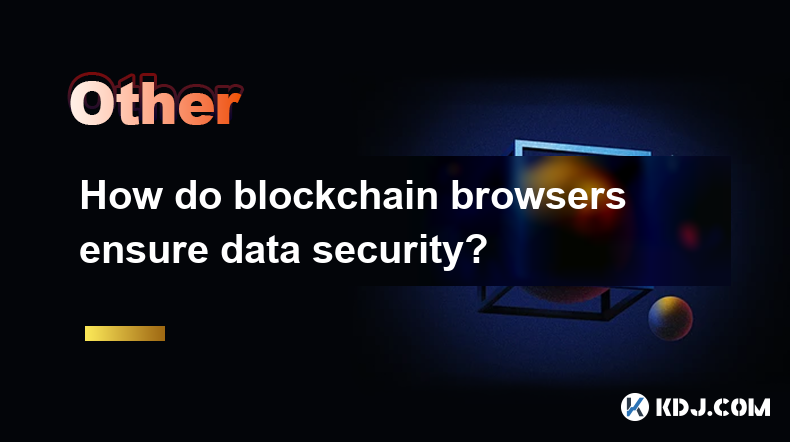
Understanding Blockchain Browser Security
Blockchain browsers are specialized web browsers designed for interacting with decentralized applications (dApps) and exploring blockchain networks. Unlike traditional browsers, they prioritize security and privacy features crucial for navigating the often-complex and potentially risky landscape of the cryptocurrency world. Their security measures differ significantly from those employed by conventional browsers, focusing on protecting users from various threats specific to blockchain interactions.
Protecting User Keys and Private Data
One of the most critical aspects of blockchain browser security is the protection of user private keys. These keys are essentially digital signatures that grant access to a user's cryptocurrency holdings and other blockchain assets. Many blockchain browsers employ secure key storage mechanisms, such as hardware wallets integration or secure enclaves, to isolate private keys from the main system, making them inaccessible to malware or unauthorized access. This isolation is a key differentiator from standard browsers, which are often more vulnerable to keyloggers and other forms of attack.
Secure Communication and Network Protocols
Blockchain browsers often utilize encrypted communication channels to protect user data during transactions and interactions with dApps. Protocols like HTTPS and TLS are standard, but blockchain browsers may also incorporate additional layers of encryption or use more secure network protocols specifically designed for blockchain interactions. This ensures that sensitive information, such as transaction details and account balances, remains confidential during transmission. The selection of robust protocols is a cornerstone of their security architecture.
Preventing Phishing and Malicious Websites
Phishing attacks are a major threat in the cryptocurrency space. Blockchain browsers often incorporate features to mitigate this risk. Some browsers include built-in warning systems that alert users to potentially malicious websites or dApps known for phishing attempts. They might also leverage blockchain's inherent transparency to verify the authenticity of dApps and smart contracts before interaction, reducing the chance of falling victim to fraudulent websites.
Sandboxing and Isolation Techniques
To further enhance security, many blockchain browsers employ sandboxing and isolation techniques. This means that dApps are run in isolated environments, preventing them from accessing the user's operating system or other applications. Even if a dApp is compromised, the damage is likely to be contained within its sandbox, protecting the user's system and other data. This approach limits the potential impact of vulnerabilities within individual dApps.
Regular Updates and Security Audits
Maintaining up-to-date software is essential for any browser, but it's especially critical for blockchain browsers. Regular updates address security vulnerabilities and improve overall protection. Reputable blockchain browsers undergo frequent security audits by independent experts to identify and fix potential weaknesses before they can be exploited by malicious actors. Transparency in these processes is crucial for user trust.
How Blockchain Browsers Handle Smart Contract Interactions
Smart contracts, self-executing contracts with the terms of the agreement between buyer and seller being directly written into lines of code, are a core component of many blockchain applications. Interacting with smart contracts requires careful consideration of security. Blockchain browsers often provide tools and features to help users review and verify the code of smart contracts before interacting with them. This allows users to assess potential risks and vulnerabilities before committing to a transaction. Thorough code review is paramount for safe interaction.
Advanced Security Features: Multi-Factor Authentication (MFA)
Many advanced blockchain browsers offer multi-factor authentication (MFA) to enhance security. MFA adds an extra layer of protection by requiring users to provide multiple forms of authentication, such as a password and a one-time code generated by an authenticator app. This makes it significantly harder for attackers to gain unauthorized access even if they obtain a user's password. MFA is a widely recommended security practice.
Data Privacy Considerations in Blockchain Browsers
While blockchain browsers focus on data security, data privacy is also a crucial aspect. Some blockchain browsers prioritize user privacy by minimizing data collection and employing privacy-enhancing technologies. They may avoid tracking user browsing history or other personal information, which is a significant advantage over traditional browsers that often engage in extensive data tracking. Privacy-focused browsers are becoming increasingly popular.
Choosing a Secure Blockchain Browser
Selecting a secure blockchain browser requires careful consideration. Look for browsers with a strong reputation, regular security updates, and transparent security practices. Read reviews, check the browser's documentation, and ensure it employs the security features discussed above. Choosing a well-established and reputable browser is crucial for minimizing security risks.
Frequently Asked Questions
Q: Are blockchain browsers completely immune to attacks?
A: No, even the most secure blockchain browsers are not completely immune to attacks. While they offer significantly enhanced security compared to traditional browsers, vulnerabilities can still exist. Staying updated with security patches and practicing good security habits is crucial.
Q: Can I use a standard browser to interact with dApps?
A: You can, but it's generally not recommended. Standard browsers lack the specialized security features designed to protect users from the unique threats present in the blockchain ecosystem.
Q: How do blockchain browsers protect against keyloggers?
A: By isolating private keys from the main system through methods like hardware wallet integration or secure enclaves, making them inaccessible to keyloggers and other malware.
Q: What is the role of sandboxing in blockchain browser security?
A: Sandboxing isolates dApps from the user's operating system and other applications, limiting the damage caused by compromised dApps.
Q: How important are regular updates for blockchain browsers?
A: Extremely important. Regular updates address newly discovered security vulnerabilities and improve overall protection against attacks.
Q: What should I look for when choosing a blockchain browser?
A: Look for a browser with a strong reputation, regular security updates, transparent security practices, and features like hardware wallet integration and MFA.
Q: Do all blockchain browsers offer the same level of security?
A: No, security features and implementations vary across different blockchain browsers. Research is crucial to selecting a browser that meets your security needs.
Q: How do blockchain browsers help prevent phishing attacks?
A: Through built-in warning systems that alert users to potentially malicious websites and by verifying the authenticity of dApps and smart contracts.
Disclaimer:info@kdj.com
The information provided is not trading advice. kdj.com does not assume any responsibility for any investments made based on the information provided in this article. Cryptocurrencies are highly volatile and it is highly recommended that you invest with caution after thorough research!
If you believe that the content used on this website infringes your copyright, please contact us immediately (info@kdj.com) and we will delete it promptly.
- Why XRP Investors Are Rushing to ExoraPad Presale
- 2025-04-03 21:45:12
- Polkadot (CRYPTO: DOT) cryptocurrency isn't getting any market love these days
- 2025-04-03 21:45:12
- Despite Launching the RLUSD Stablecoin, XRP Price Dips as Trump's Tariffs Trigger Market Turmoil
- 2025-04-03 21:40:11
- Ripple Has Once Again Unlocked a Massive 1 Billion XRP
- 2025-04-03 21:40:11
- Bitcoin price crashes to $80k as Trump announces tariffs on 50+ countries
- 2025-04-03 21:35:12
- Prominent crypto analyst sparks excitement with bold forecasts for Ethereum and Ripple
- 2025-04-03 21:35:12
Related knowledge

What are the future development trends of blockchain game development?
Apr 03,2025 at 05:00am
Blockchain technology has revolutionized various industries, and gaming is no exception. As we look to the future, several trends are set to shape the development of blockchain games. These trends not only promise to enhance the gaming experience but also to integrate blockchain technology more seamlessly into the gaming ecosystem. Let's explore these t...

What are the maintenance costs of blockchain system development?
Apr 03,2025 at 06:07pm
The maintenance costs of blockchain system development are multifaceted and depend on various factors. These costs can include technical maintenance, security updates, infrastructure expenses, and personnel costs. Understanding these elements is crucial for anyone planning to develop or maintain a blockchain system. Technical MaintenanceTechnical mainte...
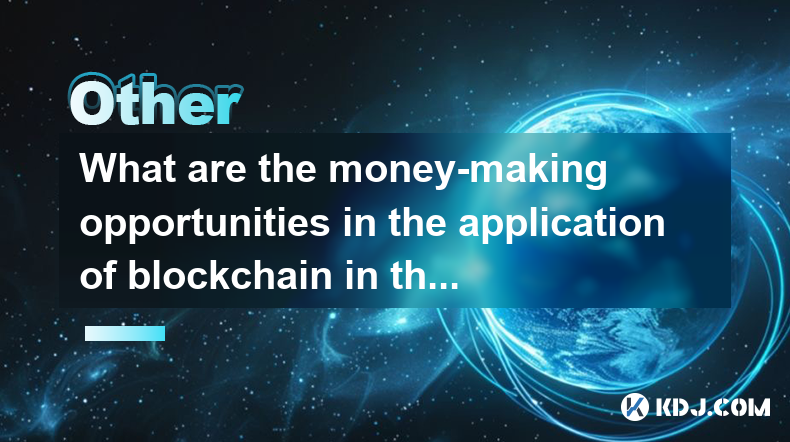
What are the money-making opportunities in the application of blockchain in the medical industry?
Apr 03,2025 at 03:35am
The integration of blockchain technology into the medical industry presents a myriad of money-making opportunities that can revolutionize healthcare systems. Blockchain's inherent characteristics, such as transparency, security, and immutability, make it an ideal solution for various medical applications. By leveraging blockchain, companies can develop ...
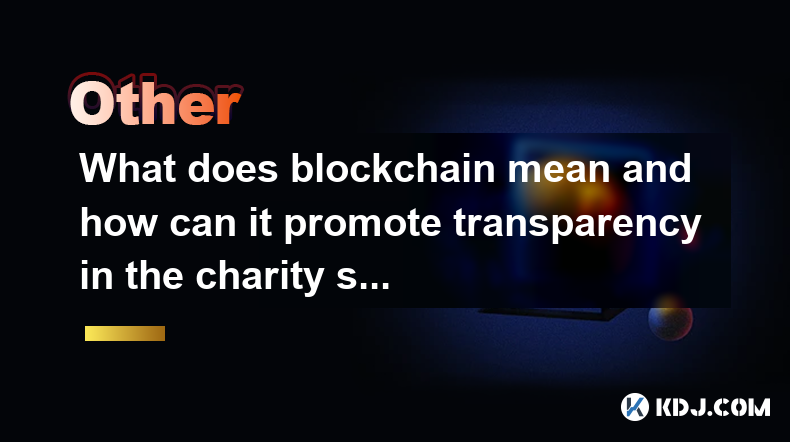
What does blockchain mean and how can it promote transparency in the charity sector?
Apr 03,2025 at 08:29pm
Blockchain technology is a decentralized, distributed ledger that records transactions across numerous computers. This ensures that the data is transparent and nearly impossible to alter retroactively. Essentially, blockchain serves as a digital ledger of all cryptocurrency transactions, enabling secure and direct exchanges without the need for intermed...
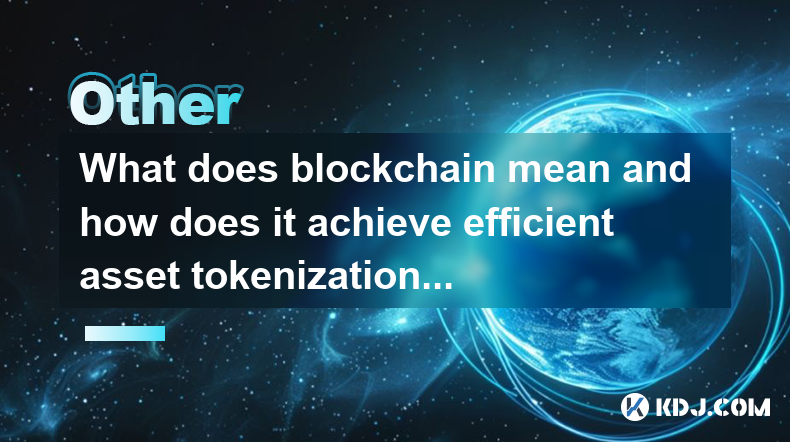
What does blockchain mean and how does it achieve efficient asset tokenization?
Apr 03,2025 at 07:57pm
Blockchain technology is a decentralized, distributed ledger that records transactions across numerous computers. It ensures that each transaction is secure, transparent, and immutable. The concept of blockchain was introduced with the launch of Bitcoin in 2009, but its applications have since expanded far beyond cryptocurrencies. At its core, blockchai...
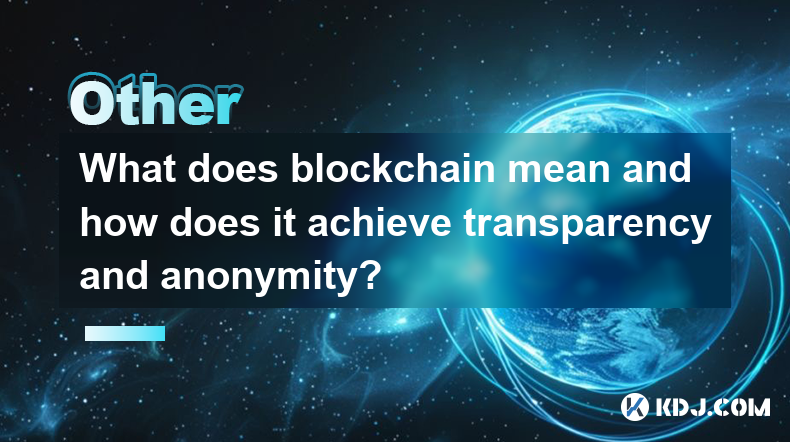
What does blockchain mean and how does it achieve transparency and anonymity?
Apr 03,2025 at 11:28am
Blockchain technology is a decentralized, distributed ledger that records transactions across numerous computers. It ensures that once data is recorded, it cannot be altered retroactively without the alteration of all subsequent blocks and the consensus of the network. This technology underpins cryptocurrencies like Bitcoin and Ethereum, providing a sec...

What are the future development trends of blockchain game development?
Apr 03,2025 at 05:00am
Blockchain technology has revolutionized various industries, and gaming is no exception. As we look to the future, several trends are set to shape the development of blockchain games. These trends not only promise to enhance the gaming experience but also to integrate blockchain technology more seamlessly into the gaming ecosystem. Let's explore these t...

What are the maintenance costs of blockchain system development?
Apr 03,2025 at 06:07pm
The maintenance costs of blockchain system development are multifaceted and depend on various factors. These costs can include technical maintenance, security updates, infrastructure expenses, and personnel costs. Understanding these elements is crucial for anyone planning to develop or maintain a blockchain system. Technical MaintenanceTechnical mainte...

What are the money-making opportunities in the application of blockchain in the medical industry?
Apr 03,2025 at 03:35am
The integration of blockchain technology into the medical industry presents a myriad of money-making opportunities that can revolutionize healthcare systems. Blockchain's inherent characteristics, such as transparency, security, and immutability, make it an ideal solution for various medical applications. By leveraging blockchain, companies can develop ...

What does blockchain mean and how can it promote transparency in the charity sector?
Apr 03,2025 at 08:29pm
Blockchain technology is a decentralized, distributed ledger that records transactions across numerous computers. This ensures that the data is transparent and nearly impossible to alter retroactively. Essentially, blockchain serves as a digital ledger of all cryptocurrency transactions, enabling secure and direct exchanges without the need for intermed...

What does blockchain mean and how does it achieve efficient asset tokenization?
Apr 03,2025 at 07:57pm
Blockchain technology is a decentralized, distributed ledger that records transactions across numerous computers. It ensures that each transaction is secure, transparent, and immutable. The concept of blockchain was introduced with the launch of Bitcoin in 2009, but its applications have since expanded far beyond cryptocurrencies. At its core, blockchai...

What does blockchain mean and how does it achieve transparency and anonymity?
Apr 03,2025 at 11:28am
Blockchain technology is a decentralized, distributed ledger that records transactions across numerous computers. It ensures that once data is recorded, it cannot be altered retroactively without the alteration of all subsequent blocks and the consensus of the network. This technology underpins cryptocurrencies like Bitcoin and Ethereum, providing a sec...
See all articles























































































